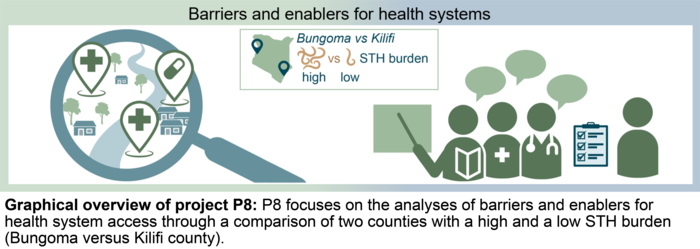P8 - Health systems’ and community-based interventions to address STH Infections in Kenya
Supervisor:
Prof. Dr. Johanna Hanefeld
Lab Address:
Robert Koch Institute, Centre for International Health Protection, Gerichtstraße 27, 13347 Berlin, Germany
Project description:
Health-systems and community-based factors involved in Soil-transmitted helminth (STH) infections, particularly relevant Ascaris infections, are key to combat the diseases especially in children, including to ensuring that no one is left behind. While mass administered public health interventions showed positive results, variability in success needs to be better understood, as it has been inferred that health systems access, social determinants, e.g., low income, but also other covariants for burden, e.g., chemotherapy, cause decisive differences. Kenya has implemented and evaluated coverage of its STH infection program for over a decade, however, also here variability in implementation is still observed as shown by us previously.
The present project aims to answer the following open question: What are the barriers and enablers for health systems access at community level for Ascaris infections in a selected high (Bungoma county) versus low (Kilifi county) burden settings and how are these enabled by different models of health service provision in Kenya? To address this question, the doctoral researcher will undertake fieldwork in Kenya across both counties and in close collaboration with KEMRI- Eastern and Southern Africa Centre of International Parasite Control, using a mixed methods research design. This will involve mapping health service provision, administering a facility questionnaire at the primary health care level, and conducting interviews and focus group discussions with health care workers, patients, and community members.
References: Sartorius et al. 2021, doi: 10.1016/S2214-109X(20)30398-3; Mwandawiro et al. 2019, doi: 10.1186/s13071-019-3322-1; Okoyo et al. 2020, doi: 10.1371/journal.pntd.0008604.
